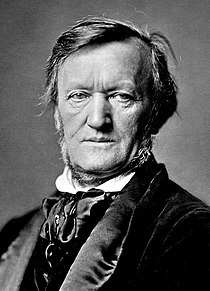The Emergence of Absolute and Programmatic MusicIt was really during the height of the Romantic movement in Europe (late 18th and early 19th centuries) that the idea of absolute music was really grasped and elaborated.I stress absolute music more than programmatic music, because it is the more obscure of the two. The majority of music, especially music today, is programmatic. That's mainly the objective of my project to investigate this further in a contemporary setting, with American music. This is a way to really bring to light the issues of absolute and program music, to sort of dust of the cobwebs for a young audience. However, we must begin further back in the history of music order to set ourselves up with the principles and underlying qualities of absolute and programmatic music.
|

It was not until the latter half of the 18th century and early half of the 19th century that absolute and program music began to receive a fairly large amount of attention from a philosophical and theoretical audience. This was part of a large movement called the Romantic movement, of which several people looked at the intrinsic (absolute) and extrinsic (programmatic) aspects of music. There were several champions of absolute music, people that believed that music had the ability to transcend the boundaries of human limitations (language, time, space, etc.) There were also those that were more affiliated with the idea of programmatic music. Among those that were proponents of absolute music were E.T.A. Hoffmann, Eduard Hanslick, and Immanuel Kant. Hoffmann did a review of Beethoven's Fifth Symphony, praising the composer's ability to ingrain an expressive quality in his music beyond words. Eduard Hanslick wrote a book, called On the Musically Beautiful. In it, he retains "that beauty in music resides not in any presumed emotional content, but rather in its form alone." (Bonds, 107) Immanuel Kant's Critique of Judgement helped to reassure the idea that music could express the "inexpressible." |

But those that resisted the existence of absolute music claimed that music on its own does not have the preciseness or rational substance that words offer to music. Among the opposers to the idea of absolute music was Richard Wagner. Wagner declared that "the advocates of absolute music don't know what they are talking about." (Wagner's Musical Prose, Grey, 1) Ironically enough, it was Wagner (right) that coined the title of "absolute music" on the debate that had existed for quite some time. It would seen that his arguments could be seen as even more valid though, they would have to be to disprove the existence of something that he had a hand in conceiving. Wagner, who did not find that Beethoven's music necessarily fell under the category of absolute music, claimed, "In works from the second half of his artistic career, Beethoven is generally incomprehensible - or rather, open to misunderstanding - in the very places where he wants to express a particular individual content in the most comprehensible way. He goes beyond what unthinking convention acknowledges as the intelligibility of absolute music, i.i. that whcih bears some kind of recognizble resemblance to the dance-air and vocal-air, it both its expression and its form. Instead he uses a language which often seems an arbitrary display of temperament and which, not being part of a purely musical context, is only articulated by dint of a poetic intention - the very thing that music could not express with the clarity of poetry. Most of Beethoven's works from that period must be seen as involuntary attempts to construct a language which would meet his desire, so that often they seem like sketches for a painting on whose object the artist had decided, without being sure how to organize it in an intelligible way. The actual painting he was unable to execute until he had attuned its object to his powers of expression, i.e. had grasped it in its universal meaning and transposed its individual element back into the characteristic colours of musical composition itself, thereby 'musicalizing' the actual object up to a point. Had the world set eyes on these really finished paintings in which Beethoven expressed himself in a refreshingly clear and intelligible way, the misunderstanding of his works that the Master promoted would certainly have had a less confusing and mesmeric effect." (Kropfinger, 118) Backtracking to Beethoven's pivotal role in music at the time, Wagner attributes the abstract effect on Beethoven's audience as just a part of the creative process behind creating works of music. As Beethoven began to evolve his music into something that was more intelligible, his "sketches" (As Wagner put it) took take the shape that pleased him. Wagner has a good point, as the highlight of Beethoven's 9th symphony (his last symphony) was the choral masterpiece "Ode to Joy." |

"...the theory of soverignty of music as Schopenhauer conceived it [has given an] extraordinary rise in the value of music...the value of the musician himself all at once went up in an unheard-of manner,too: from now on he became an oracle, a priest, indeed more than a priest, a kind of mouthpiece of the 'in itself' of things, a telephone from beyond."(Grey,4) Its obvious that Nietzsche, who was famous for being an atheist, doesn't really care to tend to the idea that the mortal men that wield music have a dissemination with God. |